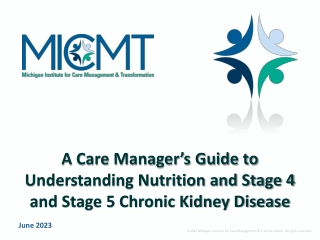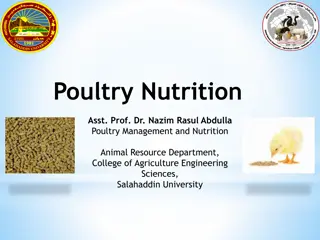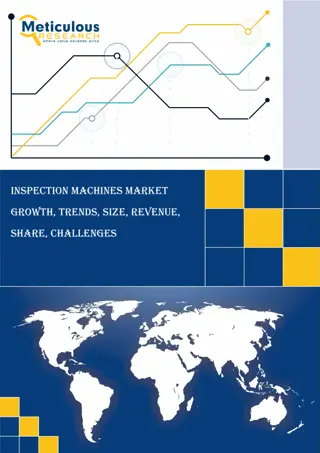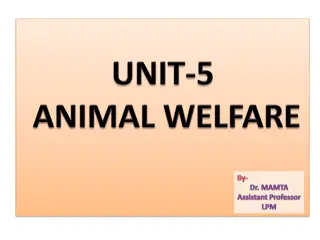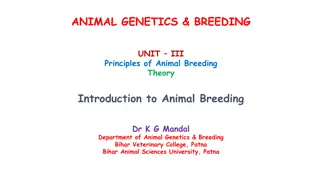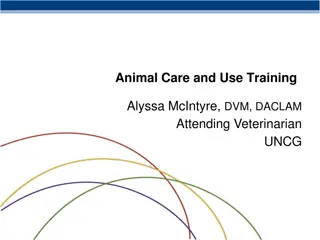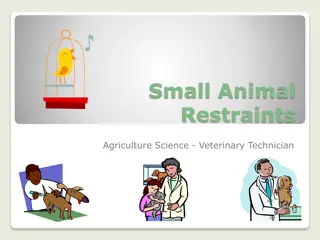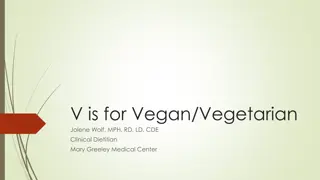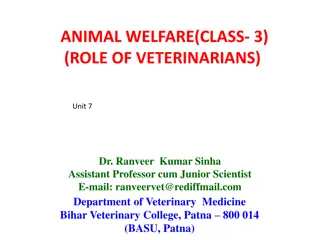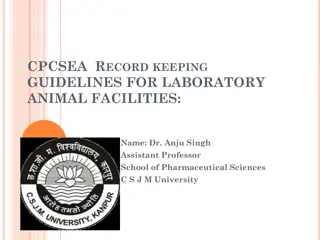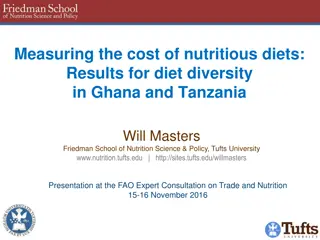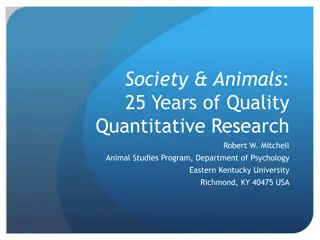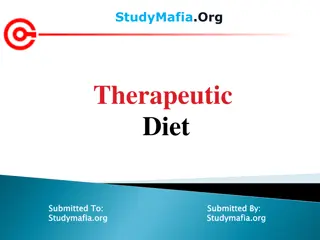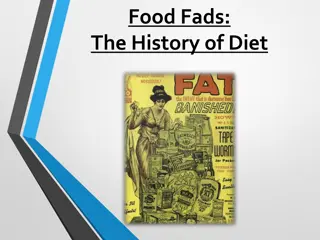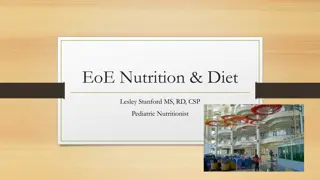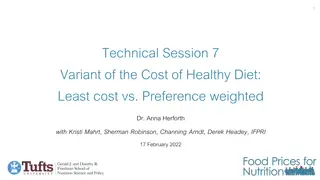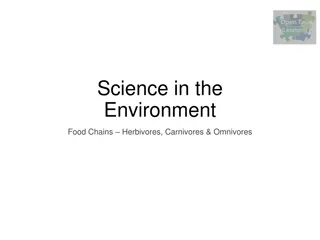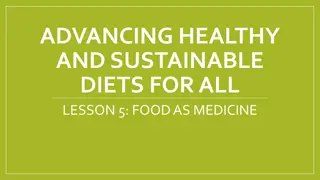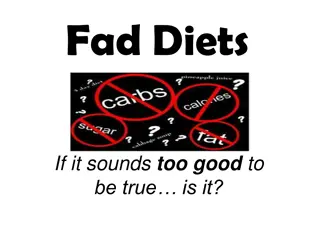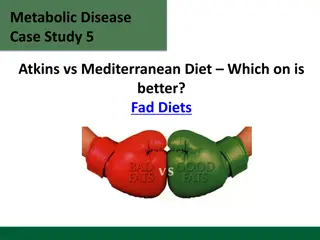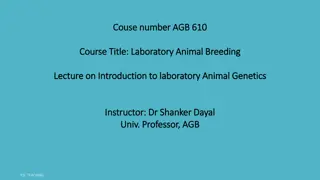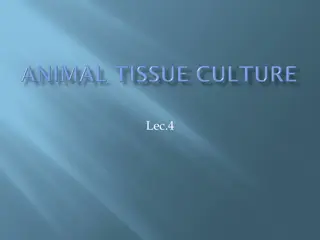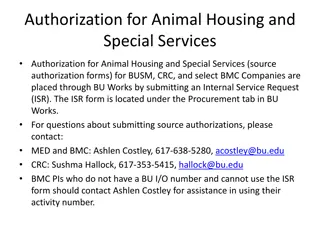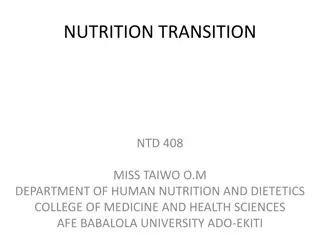Understanding Nutrition for Stage 4 and Stage 5 Chronic Kidney Disease
A comprehensive guide for care managers to understand the importance of nutrition in managing kidney disease and its impact on patients with diabetes, cardiovascular disease, and hypertension. Covers current recommendations, individualized diets based on lab values, and the evolution of kidney diets
3 views • 36 slides
History and Educational Programs of DEU Lab Animal Science Department
Established in 2004, the Department of Laboratory Animal Science at Dokuz Eylul University Institute of Health Sciences offers cutting-edge education focusing on animal welfare and ethical practices in scientific research. The department upholds the 3R Principle—Reduction, Refinement, Replacement�
0 views • 9 slides
Responsibilities of Facility Animal Care Committee at McGill University
The Facility Animal Care Committee (FACC) at McGill University oversees animal activities, ensures ethical treatment of animals, and adheres to guidelines from organizations such as the Canadian Council on Animal Care (CCAC). Responsibilities include continual oversight of animals, approving care pr
1 views • 13 slides
Poultry Nutrition
Developments in poultry nutrition have led to increased productivity in the industry over the past 20 years. The focus is shifting towards life-cycle feeding programs for different bird classes rather than individual diets. Poultry diets consist of various feedstuffs providing essential nutrients fo
2 views • 33 slides
Feed Software Market is expected to reach $456.1 million by 2030
The growth of this market is attributed to the adoption of digital technologies and automation in the animal feed industry, the growing animal population, increasing demand for healthy animal-based food products, increasing animal health expenditure and pet insurance, and the growing need to reduce
0 views • 4 slides
Animal Welfare and Ethics: Standards and Regulations in India
The content covers a wide range of topics related to animal welfare, ethics, and laws in India. It delves into the definition of animal welfare, the role of veterinarians, animal welfare organizations, regulations like the Prevention of Cruelty to Animals Act, and protection of wildlife, working ani
0 views • 15 slides
Principles of Animal Breeding: Introduction and Historical Perspective
This unit covers the introduction to animal breeding, the application of genetics principles in breeding, historical perspectives including the work of Robert Bakewell, and key events in animal breeding evolution. Topics include breeding systems, importance of animal breeding, and notable figures in
1 views • 12 slides
Importance of Training in Animal Care and Use for Research
Training in animal care and use is essential to ensure humane and appropriate treatment of research animals, promote regulatory compliance, and uphold high standards of science and animal well-being. The presentation covers the necessity of training, goals including reviewing animal use and identify
0 views • 53 slides
Small Animal Restraints and Safe Handling Practices in Veterinary Technology
Importance of safe practice when working with small animals includes preventing harm, reducing injury, and minimizing stress. Proper animal handling methods and tools are crucial for the safety of both animals and handlers. Common methods of handling different species, demonstrating appropriate anim
1 views • 22 slides
Understanding the Difference: Animal Rights vs. Animal Welfare
Explore the nuanced distinction between animal rights and animal welfare, delving into the ethical considerations, philosophies, and advocacy efforts surrounding these concepts. Discover how animal rights proponents emphasize the equal rights of animals, while animal welfare focuses on humane treatm
0 views • 36 slides
Understanding Vegetarian Diets: Benefits and Varieties
Discover the different types of vegetarian diets, health benefits, reasons to choose a vegetarian lifestyle, and insights into weight loss considerations. Learn how plant-based diets can improve heart health, lower diabetes risk, and explore the importance of making healthy food choices within a veg
0 views • 43 slides
Role of Veterinarians in Animal Welfare
Veterinarians, especially with the increasing number of female professionals in the field, play a crucial role in promoting animal welfare through daily practices, advocacy, education, and research. They are involved in various sectors like biomedical, wildlife, and farm animal research, as well as
3 views • 10 slides
Laboratory Animal Facilities Record-keeping Guidelines
Guidelines for maintaining records in laboratory animal facilities include provisions for animal housing, staff records, health monitoring, and standard operating procedures. Compliance with CPCSEA regulations ensures ethical review procedures for animal research proposals. Focus is on providing a s
6 views • 11 slides
Transforming Agriculture for Sustainable Development: Ending Hunger, Ensuring Food Security, and Promoting Nutrition
Sustainable Development Goal 2 focuses on ending hunger, achieving food security, and promoting sustainable agriculture. Initiatives include shifting towards healthier diets, ensuring safe and nutritious food supply, doubling production and profits, preserving biodiversity, reducing food waste, empo
1 views • 13 slides
Measuring the Cost of Nutritious Diets in Africa: Insights from Ghana and Tanzania
Results of a study on measuring the cost of nutritious diets in Ghana and Tanzania have been presented by Will Masters from Tufts University. The study, funded by UKAid, explores the affordability of nutritious diets in Africa and the trends in food prices. Various food price indexes and indicators
4 views • 24 slides
Exploring Human-Animal Interactions through 25 Years of Quality Research
Delve into the interdisciplinary realm of human-animal interactions with a focus on social sciences and quantitative research. Discover key themes such as social psychology, therapy, animal welfare, and more. Explore attitudes and personality differences related to animal treatment, empathy, and bel
1 views • 26 slides
Guide to Planning Balanced Diets for All Age Groups
Learn about the importance of balanced diets, nutritional needs for different age groups, and how to plan balanced menus using the food pyramid. Discover tips for weaning babies onto solid foods, including the introduction of iron-rich cereals and vitamin C sources. Ensure babies' diets are free fro
0 views • 39 slides
Understanding Special Diets and Managing Obesity
Explore the impact of nutrients on our bodies, causes of special diets, health issues linked to certain diets like obesity and vegetarianism, and dietary guidelines to manage conditions like CHD and Coeliac disease. Delve into the challenges of childhood obesity in Ireland, reasons for overeating, h
0 views • 37 slides
Exploring Vegetarian Diets for Health and Sustainability
Dive into the world of vegetarian diets, understanding the reasons why people choose this lifestyle, exploring various vegetarian variations, addressing concerns and advantages of a vegan diet, learning about protein sources, comparing protein-rich menus, and being mindful of feeding infants a vegan
0 views • 20 slides
Understanding Therapeutic Diets for Health Improvement
Therapeutic diets play a crucial role in managing medical conditions by modifying regular diets. These diets are personalized to address specific health concerns and are recommended by healthcare professionals. By controlling the consumption of certain foods or nutrients, therapeutic diets aim to im
0 views • 19 slides
Understanding Food Groups and Balanced Diets
Women of reproductive age are vulnerable to nutritional deficiencies, especially during pregnancy and lactation. The Minimum Dietary Diversity for Women indicator is crucial for assessing the micronutrient adequacy of diets. It emphasizes the importance of including various food groups in the diet,
0 views • 5 slides
Foodprint: Transforming European Food System Through Social Innovation
The European food system is at a breaking point, with highly unsustainable diets and disconnected consumers. The EU's Farm to Fork Strategy calls for a shift towards more sustainable diets, advocating for societal awareness and engagement. The Foodprint approach aims to foster social innovation by i
0 views • 7 slides
Embracing Insect-Based Diets for a Sustainable Future
Emphasizing the urgency of meeting the growing protein demand sustainably, the article explores the benefits of entomophagy - consuming insects as food. Experts advocate for insect-based diets to address environmental concerns, citing insects as a rich protein source with lower greenhouse gas emissi
0 views • 6 slides
Decoding Super Diets: What Works and What Doesn't
Explore the truth behind popular diets like Paleo, Blood Type Diet, Anti-Inflammatory Diet, Atkins Diet, South Beach Diet, Weight Watchers, Jenny Craig, Nutrisystem, HMR Diet, and Herbalife. Learn about meal replacers, the effectiveness of various diets, and why sustainable lifestyle changes are the
0 views • 14 slides
Exploring the Fascinating History of Fad Diets and Vegetarianism
Uncover the intriguing journey of fad diets and vegetarianism, from the Victorian era's vegetarian movement to Horace Fletcher's unique chewing diet. Learn about the exaggerated beliefs surrounding fad diets and the origins of vegetarianism in Britain, including Fletcherism's emphasis on chewing foo
0 views • 11 slides
Understanding Elemental Diet in Pediatric Nutrition for EoE Treatment
Eosinophilic esophagitis (EoE) is a condition where certain foods trigger an inflammatory response. Elimination diets like the elemental diet, which involves amino acid-based formulations, have shown positive results in treating EoE in children. Implementing specific exclusion diets and milk elimina
0 views • 12 slides
Understanding Dog Diets in the UK: Trends and Influences
Investigating dog diets in the UK, this study explores the types of diets fed to dogs and the impact of human diet types on them. The research delves into reasons behind choosing specific diets, utilizing a questionnaire distributed via social media and promoted by the BBC. Results show a variety of
0 views • 13 slides
Understanding Cost Variants in Healthy Diets: Least Cost vs Preference Weighted
The discussion delves into the concept of least-cost versus preference-weighted healthy diets, highlighting the differences in cost and food selection. It explores how preference weighting takes into account food preferences of low-income consumers, providing insights into the affordability and cult
0 views • 18 slides
Understanding Animal Diets: Herbivores, Carnivores, and Omnivores
Explore the world of animal diets by learning about herbivores, carnivores, and omnivores. Discover what different animals eat and the classifications based on their diet preferences. Engage in activities to distinguish between herbivores, carnivores, and omnivores, and understand the special charac
0 views • 14 slides
Understanding Animal Dietary Needs for Health
Animals require the right amount and types of foods to stay healthy. Different animal species have specific diets - herbivores eat plants, carnivores consume meat, and omnivores include both in their diet. Providing the correct food ensures proper growth, strength, and overall health. Giving animals
0 views • 8 slides
Advancing Healthy and Sustainable Diets Lesson 5: Food as Medicine
This lesson focuses on promoting sustainable diets for all through the concept of food as medicine. It explores the importance of mindful eating, setting dietary goals, and overcoming barriers to achieving a healthy diet. The curriculum aims to educate individuals on sustainable food systems and beh
0 views • 10 slides
Exploring the Impact of Different Diets on Earthworm Growth Rates
This project delves into how various diets affect the growth rates of earthworms. By providing different food sources to earthworms and monitoring their growth, the study aims to uncover the diet that promotes the fastest growth. The project also includes details on earthworm anatomy, the setup of t
0 views • 10 slides
Upgrading to TOPAZ Elements: Enhancing Animal Protocols, Orders, Census, and Billing
The Animal Resource Facility (ARF) and Office of Animal Care Compliance (OACC) are shifting to TOPAZ Elements, a comprehensive web-based system, to streamline management of animal protocols, orders, census, and billing. This upgrade aims to provide better oversight for PIs, enhance compliance with r
0 views • 8 slides
Understanding the Challenges of Fad Diets and Weight Loss Efforts
Fad diets promise quick results, but often fail to deliver sustainable weight loss. Many individuals, including teens, are struggling with obesity and related health issues due to poor dietary choices and lack of physical activity. Long-term risks such as heart disease, cancer, and diabetes highligh
0 views • 17 slides
Comparing Atkins and Mediterranean Diets for Metabolic Disease: A Case Study
In this case study, the Atkins and Mediterranean diets are compared in terms of their impact on metabolic health. The Atkins diet focuses on low carbohydrate intake, leading to gluconeogenesis and changes in insulin levels. On the other hand, the Mediterranean diet emphasizes unsaturated fats from p
0 views • 19 slides
Understanding Laboratory Animal Genetics and Research Importance
This course (AGB 610) delves into the realm of laboratory animal breeding, exploring the significance of using animals in research and teaching. Dr Shanker Dayal, a distinguished professor, guides students through lectures on animal genetics and the common uses of laboratory animals. The course emph
0 views • 14 slides
Understanding Animal Tissue Culture and Cell Line Production
Animal tissue culture involves growing tissues separate from the animal in a laboratory setting. To achieve exponential cell growth, cells are converted into immortal cell lines. The production of a cell line involves steps like breaking cell adhesion, incubation, and transferring cells to fresh med
0 views • 22 slides
Authorization for Animal Housing and Special Services Process Guidelines
The guidelines outline the process for authorizing animal housing and special services at BUSM, CRC, and select BMC Companies through BU Works via Internal Service Requests (ISR). Investigators must submit ISR forms for animal housing at the Animal Science Center, monitor charges, and provide advanc
0 views • 8 slides
Evolution of Nutrition Transition: Impact on Human Health
The Nutrition Transition discusses the shifts in diet patterns and physical activity levels over human history, leading to changes in body composition and health. It explores the stages of transition from hunter-gatherer lifestyles to modern diets, high in fat, salt, and sugar. This evolution has le
0 views • 11 slides
Understanding American Food Choices: A Guide to Different Diets
Explore the diversity of diets in the United States, including organic, vegetarian, vegan, local, low-fat, and gluten-free options. Learn how these dietary choices impact health and the environment, and discover tips for making informed food selections while traveling in America.
0 views • 19 slides
